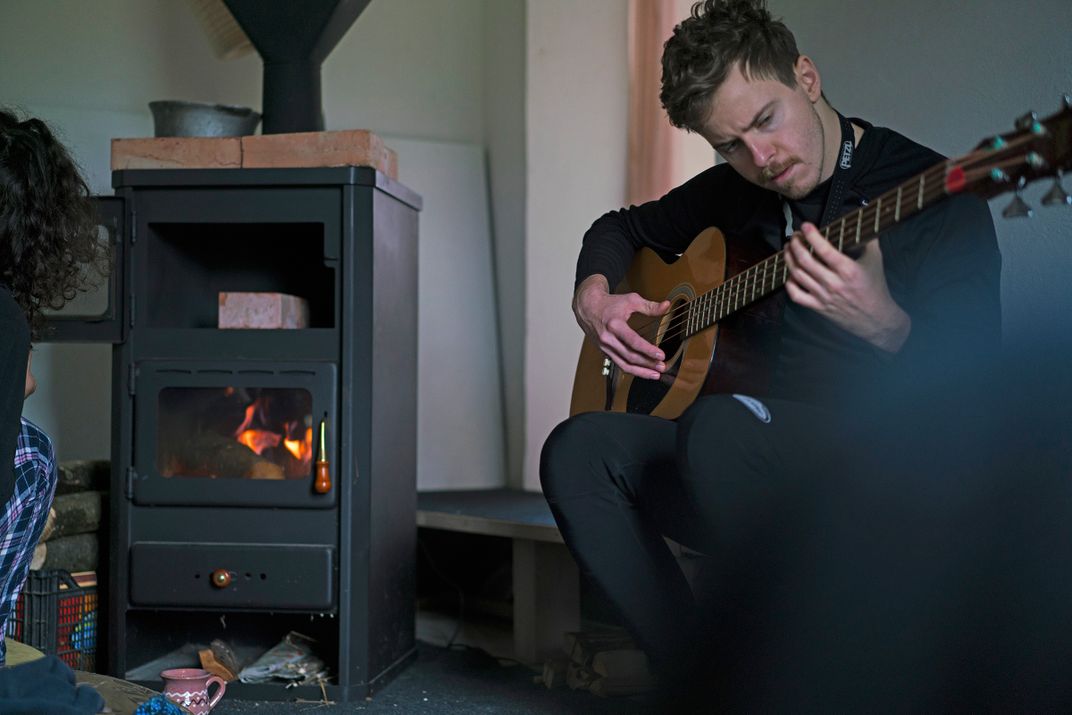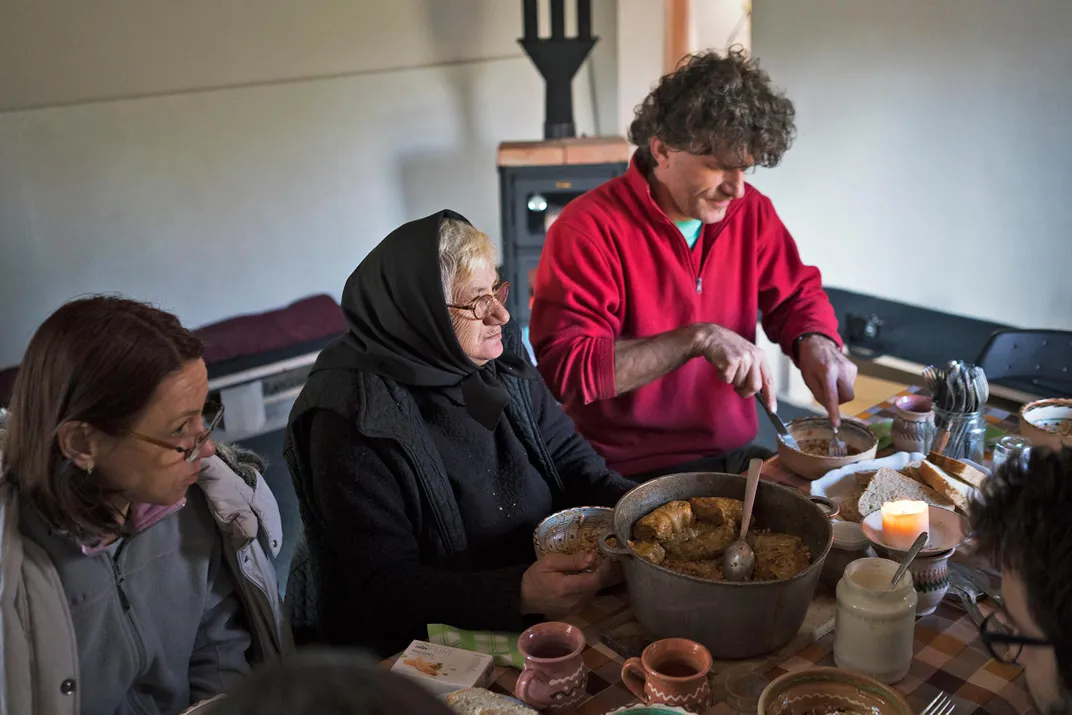Try Your Hand at Organic Farming in Southwest Romania
By hosting travelers, local farmers hope to reverse the impact of big industry
/https://tf-cmsv2-smithsonianmag-media.s3.amazonaws.com/filer/07/f6/07f6af98-b5dc-433f-8b71-6988a47f245b/sqj_1604_danube_wwoof_06.jpg)
The cherries come in June. Blackberries in July. And yellow plums, with buzzing bees to gently swat away, in August. Yet for Marius and Cornelia Miclăuș, the warm months of spring and summer begin when strangers venture onto their green folds of land in the Carpathian Mountains of southwest Romania. Marius is a sort of house-whispering architect who ascribes emotions to sagging structures, reviving them brick by brick. Cornelia is a former economist from the Danube Delta who gets pleasure in baking and serving bread. “The happiness is so close, and we share it,” she says.
Contact them online, and they are likely to welcome you to Dealu’ Cerului, or Sky Hill. They host travelers at this summer home through WWOOF, an organization that got its start from a 1971 Time Out advertisement. “Working Weekends on Organic Farms,” read the ad posted by London secretary Sue Coppard, who wanted to round up likeminded people to clear brambles in the countryside. “I hadn’t the remotest notion it would one day become a thriving, worldwide network,” she later wrote. The acronym evolved to stand for World Wide Opportunities on Organic Farms, and today it’s often used as a verb.
WWOOFing is a modern form of barter: In exchange for sowing seed, feeding animals, or cutting wood, travelers eat and sleep at no cost. To skeptics, this may seem like an odd mix of hard labor, vacation, and blind date. To travelers on a small budget, and those interested in sustainable agriculture and authentic accommodations, it can be sublime. Which is why tens of thousands of students, professionals, honeymooners, and even septuagenarians WWOOF.
At Sky Hill, the Miclăuș’ summer haven, volunteers can pick berries for jam, dry medicinal plants for tea, cut grass, or stuff mattresses with sweet-smelling hay. The Miclăușes also welcome architecture students to work on design and restoration projects. Cornelia serves everyone fresh fruit and vegetables from the farm, along with sheep’s milk cheese bought in the village. Sometimes guests take bike rides with their Romanian hosts, visiting the old watermills of nearby Eftimie Murgu.
Visitors like Swedish medical student Kaj Henriksson leave with memories of bonfires under incandescent stars and walking barefoot in the grass, a loaf of bread in hand that was baked in a traditional adobe oven from the Miclăuș’ wheat. “You get to see real people’s lives,” says Henriksson, who has visited Cornelia and Marius on the farm and also at their home in the city. “They were really almost too kind.” Czech zoology student Monika Nováková weeded and painted to earn her keep. “WWOOF gave me a way to travel alone but not be alone,” she says.
To WWOOF in southwest Romania is to leave behind the blue glow of computer screens and the din of city life. It is to work by hand, to move slowly, to feel the quiet exuding from the rolling hills, to step temporarily into a way of life that is vanishing: peasant farming. Some 4.7 million farmers in Romania have survived by eating what they grow and trading for what they lack, never needing much cash. Many live in the “chernozem belt,” where the rich, black soil has long sustained its caretakers. (Chernozem is so fertile a soil, in fact, that it has reportedly been dug up and sold by the truckload on Ukraine’s black market.)
Nonetheless peasant farming is in swift decline. Every hour between 2010 and 2013, three small farms disappeared in Romania. Banks, European Union subsidies, and laws crafted in Bucharest favor large-scale industry, leaving some farmers without the funds or equipment to compete. State-owned lands where farmers communally graze their livestock have been rented to foreign investors. Aging farmers, whose children are often uninterested in tending the land, lease or sell their parcels to agricultural companies.
Yet few such companies offer stable employment; some disrupt village water supplies and use chemical fertilizers, pesticides, and fungicides that threaten the Danube’s immense bird life and other ecosystems.
**********
In their own small way, many WWOOF hosts hope to reverse these trends. Among them is former ethnographer Ondřej Kano Landa, a Czech, and his Tokyo-born wife Fukiko. They care for a plot of land in an isolated hamlet roughly 40 miles from Sky Hill. About 70 villagers remain there—and the average age may be the same number. The young have left in search of city jobs. The school closed a few years back. But along dusty roads lined by warped fences, Ondřej can still listen to people speak the same Czech dialect as his father.
The village is one of Romania’s six ethnic Czech settlements. In the 1800s, when the Danube divided the Habsburg Monarchy and the Ottoman Empire, Czech farmers came here on promises of land. They were given old-growth forest and suffered hardship and disease. A third of the region’s Czechs returned to Czechoslovakia in the 1940s, but few left this remote village, about 40 miles from the port city of Orșova; they simply learned too late of the chance to resettle before Romania officially ended the emigration.
While young generations have now moved away, Ondřej and Fukiko have settled on a small, elevated plot surrounded by beech trees. They named their farm Offcompany, and they live largely off the grid. They carry water by hand because they sold their horse. Their technology is limited to a portable solar panel and a broken chainsaw, which they might get around to fixing someday. They have no bathroom, and bathe with a bucket or outdoors in a fire-heated tub. To them, owning little, untethered to economic and political institutions, leads to “inner freedom.”
Ondřej and Fukiko don’t even own the land they live on, but have been caring for it indefinitely since one of its elderly owners died, and the other owner, unable to manage it by herself, relocated. “Many families are selling their land to big companies that want to do something with it, and nobody knows what. But this family is resisting, they feel the land is heritage from their ancestors,” says Ondřej. The couple expects their first WWOOF visitors this summer, when they will be able to seed, weed, gather firewood, and help build a fence.
**********
Marius, the grandson of peasant farmers, remembers childhood summers in the northern region of Maramureș. He recognizes that life wasn’t easy. There were hardships then that still persist today—long hours, sometimes working when sick or injured, and being at the mercy of nature’s whims. Cornelia still speaks of her father’s vineyard, which was destroyed when the Danube overflowed in 1970—and again in 1980. But the couple also recalls a different ethos—a generation that took pride in living off of what the land gave them. “They didn’t use the land, the land was a friend, like somebody from the family who takes care of them,” says Marius. “The philosophy was different than now.”
Sky Hill offers the Miclăușes a chance to return to that lifestyle—even if only for the summer. The two-hour drive from their home in the city of Timișoara, dubbed “Little Vienna” for its beautiful architecture and squares, takes them not only to a vastly different physical setting, but to a different state of mind.
In the fall, they leave behind the swaying grasses and sloping hills to return to their clamoring city. No more baths in the river, no more buzzing of bees over the fields. “We don’t have the forest with the songs of the birds,” says Cornelia. “We don’t have that deep silence like in Sky Hill.” Until the next summer and the arrival of a new stream of strangers who long to know of Sky Hill’s simple pleasures.
How to WWOOF
There are more than 13,000 host farms from around the world on wwoof.net. A volunteer’s only expense, beyond the price it takes to get there and some cash for incidentals, is an annual country membership fee (20 euros for foreigners visiting Romania). After buying a membership, prospective WWOOFers should message their host at least one month before the trip to get acquainted and clarify terms and expectations. Whether WWOOFing for a few days, a few weeks, or much longer, says Amanda Pearson, international development coordinator at the Federation of WWOOF Organizations, “it’s about the farmer opening his heart and his door.”
Planning Your Next Trip?
Explore great travel deals
Smithsonian magazine participates in affiliate link advertising programs. If you purchase an item through these links, we receive a commission.

